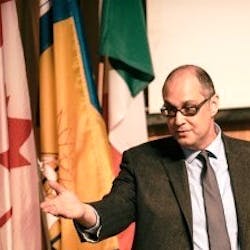Re-Telling Reconciliation
- Details
- Resources
Reconciliation between Indigenous and non‐Indigenous peoples is a central challenge facing Canada, as well as other societies around the world. Meeting this challenge is hindered by ways of thinking and talking, as well as concepts of history, that limit understandings and perspectives on why this challenge is a fundamental one facing humanity, and what might be done to address it. This presentation will examine what the story of reconciliation might be from a perspective informed by the Bahá’í writings and experience and what the roles and responsibilities of individuals and communities are in rising to meet this challenge.
Roshan Danesh
Roshan is a lawyer, conflict resolution innovator, and educator whose areas of work, teaching, and writing include constitutional law, Indigenous rights, international peace-building, and leadership and organizational change. Roshan completed his S.J.D at Harvard Law School and LL.B at the University of Victoria, and has taught at many academic institutions including the University of British Columbia and University of Victoria. For the last 15 years Roshan has worked extensively on advancing Indigenous title and rights and reconciliation, including advising the Union of BC Indian Chiefs, the British Columbia Assembly of First Nations, Indigenous nations across Canada, as well as the federal, provincial, and local governments. From 2017 - 2018 Roshan served as the special counsel on Indigneous reconciliation to the Minister of Justice and Attorney General of Canada Jody Wilson-Raybould. Roshan has also advised governments and organizations around the world, including the United Nations, in the areas of peace-building, human rights, proactive conflict-resolution, organizational management and change, and leadership. Roshan is the author of dozens of publications, including Dimensions of Baha'i Law (2019, Baha'i Publishing Trust).

38th Annual Conference
Scholarship and the Life of Society
The views expressed in this recording are those of the presenter and do not necessarily represent the views of the Association for Bahá’í Studies, nor the authoritative explications of Bahá’í writings.